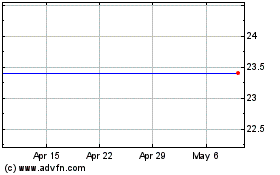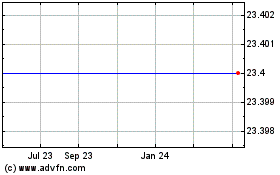Valeant Makes Deal To Loosen Debt Terms -- WSJ
August 19 2016 - 3:04AM
Dow Jones News
By Anne Steele and Michael Rapoport
Valeant Pharmaceuticals International Inc. has again reached a
deal with its loan holders to amend its debt terms, giving it more
breathing room as it continues to dig out from a year of business
and accounting distress.
The amendment announced Thursday makes it easier for the
Canadian drugmaker to meet a key debt-covenant requirement. It also
gives Valeant more flexibility to sell assets and borrow more, as
it aims to pare its $31 billion debt load.
But Valeant's troubles aren't fully behind it. T. Rowe Price
Group Inc. filed a lawsuit against the company earlier this week in
federal court in New Jersey, according to court documents made
available Thursday. The mutual-fund giant, which was once one of
Valeant's biggest shareholders, alleges that Valeant engaged in "a
fraudulent scheme" that cost it and other shareholders billions of
dollars.
A Valeant spokesman said the company hadn't yet been served with
the lawsuit but was aware of it, and added that it repeated claims
from existing litigation against the company.
"Valeant intends to defend itself and cannot comment further on
ongoing litigation," he said.
Regarding the debt amendment, Valeant Chief Executive Joseph
Papa said the company is "pleased to have the support of our
lenders and appreciate their confidence in the company's future."
The amendment "allows us to focus on executing our strategic plan,
developing our pipeline and improving patients' lives," he
said.
The debt agreement and the lawsuit accent a busy week for
Valeant, also marked by upgrades for its stock by analysts at
Morgan Stanley and Mizuho Securities and news that another fund
giant, Fidelity, had sharply boosted its stake in Valeant in the
first half of 2016.
Valeant shares fell 3.1% to $29.08 in midafternoon trading,
after gaining 20% in the first three days of the week. The stock is
still down nearly 90% from a year ago over concerns about Valeant's
drug-price increases, accounting problems, a brush with potential
debt default earlier this year, and investigations by Congress and
federal regulators. The Wall Street Journal reported last week that
Valeant is also under criminal investigation over whether it
defrauded insurers by hiding its close ties to mail-order pharmacy
Phildor Rx Services LLC.
The amendment to Valeant's debt agreement eases a requirement
for the company to maintain a minimum level of Ebitda (earnings
before interest, taxes, depreciation and amortization) relative to
the cash interest it pays on its debt. Thursday's pact lowers that
required level to Ebitda of two times interest, from its previous
2.75. That effectively allows Valeant to generate less Ebitda while
still complying with the requirements set by its loan holders.
The move addresses concerns of analysts that Valeant had too
little headroom in producing enough earnings to meet the old
requirement. Last week, Valeant backed its guidance for the
yearearnings guidance for the year, indicating it thought it could
stay in compliance with the debt requirement even without a change.
But Mr. Papa acknowledged then that the company's cushion wasn't
"as much as investors wanted it to be" and that Valeant planned to
ask lenders to loosen the requirement.
Valeant's ability to modify its debt agreements indicates it is
still on good terms with most of its lenders, who generally see
value in its business despite ongoing difficulties. In return for
the latest change, Valeant agreed to pay a fee to its lenders and
to increase the interest-rate margins on its credit facility by
half a percentage point.
Lenders had previously granted Valeant a covenant break in
April, when the requirement of Ebitda of 2.75 times interest was
set and debtholders agreed to push back regulatory filing deadlines
to spare Valeant from potential default.
In the lawsuit, meanwhile, T. Rowe Price alleges Valeant used
its ties to Philidor, deception in pricing and reimbursement
practices, and "fictitious accounting" to artificially inflate its
results and shield its drugs from competition.
The fund company once owned as much as 21.5 million Valeant
shares, a 6.4% stake, before selling most of it earlier this year
after the stock's price tumbled, according to securities filings.
As of June 30, T. Rowe Price owned about 1.5 million Valeant
shares.
Michael Pearson, Valeant's former chief executive, and five
other current or former Valeant executives are also named as
defendants in the lawsuit. Alleghany Cos., another Valeant
shareholder, is also a plaintiff.
The T. Rowe Price lawsuit is separate from pending class-action
shareholder litigation in New Jersey that makes similar claims
against Valeant and is led by the TIAA pension fund. T. Rowe Price
"opted out" of the class action to pursue its claims individually,
a move that enables the fund company to pursue certain claims it
can't pursue in a class action.
--
Sam Goldfarb
contributed to this article.
Write to Anne Steele at Anne.Steele@wsj.com and Michael Rapoport
at Michael.Rapoport@wsj.com
(END) Dow Jones Newswires
August 19, 2016 02:49 ET (06:49 GMT)
Copyright (c) 2016 Dow Jones & Company, Inc.
Valeant Pharma (NYSE:VRX)
Historical Stock Chart
From Mar 2024 to Apr 2024

Valeant Pharma (NYSE:VRX)
Historical Stock Chart
From Apr 2023 to Apr 2024
